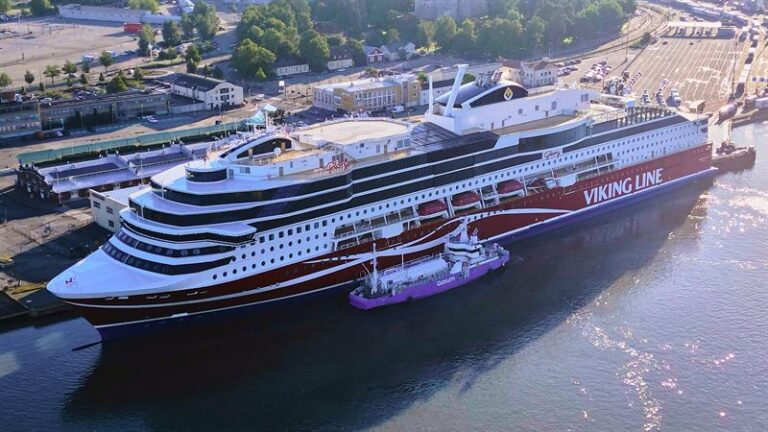Viking Line has announced a significant increase in the company’s use of biofuel. This autumn, Viking Line will increase its purchases of renewable biofuel (bio-liquefied natural gas or bio-LNG) sixfold, which means purchasing European biogas equivalent to Viking Glory’s total fuel consumption. The biofuel will be consumed on the Turku–Stockholm route by Viking Glory and Viking Grace. LNG will also be used as a complement.
“By running on biogas, Viking Line contributes to emission reductions in Gasum’s pooling service for FuelEU Maritime compliance, which is used by vessels that cannot use biofuel themselves,” said Jacob Granqvist, vice president, maritime at Gasum. “Viking Line thus helps the entire maritime transportation sector to reduce emissions. Starting on January 1, 2025, vessels must reduce their emissions by 2 percent, but required reductions will increase all the way to 80 percent by 2050. We therefore need trailblazers, like Viking Line, which can pave the way for others.”
Viking Line has collaborated with Gasum for a number of years. Viking used 10 tons of biogas in 2023 and about 600 tons in 2024. This year, biogas use will increase at least sixfold to 3,800 tons. At the same time, Viking Line’s greenhouse gas emissions will be reduced by 17,000 tons.
“We have worked with others to create the market for biogas,” added Dani Lindberg, head of sustainability, Viking Line. “Supply has now increased to a level that enables the use of renewable fuel to a significant extent. We have now been able to agree on our purchases through to October, and our goal is to continue at the same level. Moreover, the amount of bio-LNG used will increase thanks to the fossil-free maritime journeys that our customers purchase.”
Viking Line is now providing fossil-free maritime transportation on all routes for the first time. For an additional fee, passengers, conference guests and cargo customers can opt to make their journey completely fossil-free, which means their trip does not produce any fossil emissions at all.
“In the 2025 survey for Finnish maritime transportation, carried out by EPSI Rating, 45% of respondents indicated that they will make more sustainable choices in the future when they travel,” said Lindberg. “These alternatives will become a reality only through long-term development work, bold investments and good collaboration. For example, the increased use of biofuel and the resulting decrease in total emissions have been made possible thanks to the company’s €450m [US$523m] investment in Viking Glory and Viking Grace.”
“We want to be among the pioneers when Finnish maritime transportation shows the way to a fossil-free future for the rest of the world. Major investments in sustainable solutions require predictability in operations and good collaboration both throughout the maritime cluster and with public sector actors,” said Viking Line’s CEO, Jan Hanses.
Viking Line has been involved in developing a green maritime corridor between Turku and Stockholm as well as between Helsinki and Tallinn. In early June, the company presented a concept for a 100% electric passenger-car ferry on the Helsinki–Tallinn route, which should be placed in service as early as the 2030s



